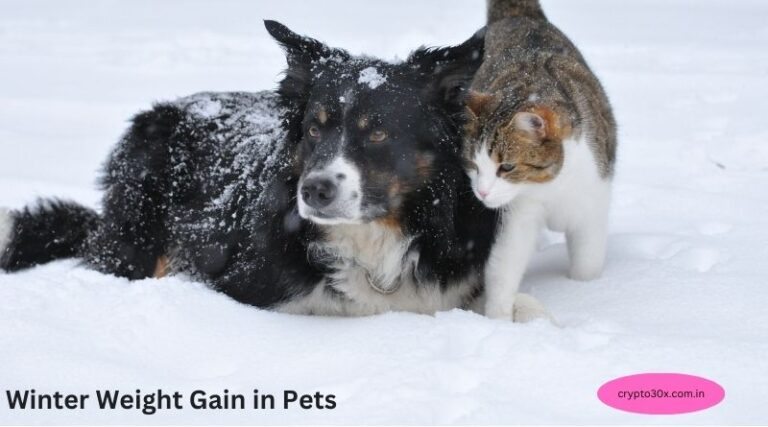Understanding Winter Weight Gain in Pets
As the winter months roll in, many pet owners notice a subtle but persistent change in their pets: an increase in weight. Winter weight gain in pets is a common issue, particularly in colder regions where the drop in temperature can lead to decreased activity levels and changes in metabolism. Understanding why this happens is the first step in preventing it.
During the colder months, pets, like humans, tend to stay indoors more often. Reduced outdoor activities mean fewer opportunities for exercise. Moreover, many pets, especially those with thick coats, have evolved to store extra fat during winter as an energy reserve for survival. While this might have been crucial for their wild ancestors, for domesticated pets with regular feeding schedules and warm homes, this natural adaptation can lead to unhealthy weight gain.
Another contributing factor is the behavioral changes in pet owners. Cold weather often discourages outdoor walks or playtime, leading to a sedentary lifestyle for both pets and their humans. Additionally, owners may overfeed their pets during winter, either out of concern for their energy needs or as a way to compensate for reduced outdoor activity. Treats and snacks also become more common during holiday celebrations, further contributing to weight gain.
The Risks of Winter Weight Gain
Excess weight in pets is not merely a cosmetic issue; it poses serious health risks. Overweight pets are at a higher risk of developing chronic conditions such as diabetes, heart disease, arthritis, and joint problems. For senior pets, the added weight can exacerbate age-related issues, making mobility even more difficult.
Carrying extra weight can also compromise a pet’s immune system, making them more susceptible to illnesses during the winter months when they already face seasonal challenges. Additionally, obesity can shorten a pet’s lifespan and reduce their overall quality of life.
Recognizing the Signs of Weight Gain
Pet owners must stay vigilant to notice the early signs of weight gain. Common indicators include a visible layer of fat over the ribs, a lack of a defined waist, difficulty in walking or playing, and increased lethargy. Regular weigh-ins and monitoring your pet’s body condition score can help you track their weight accurately.
If you suspect your pet is gaining weight, consult a veterinarian for an evaluation. A professional assessment will help determine whether the weight gain is due to seasonal changes or an underlying medical condition that requires treatment.
Tips to Prevent Winter Weight Gain in Pets
Maintain a Balanced Diet
Proper nutrition is essential for managing your pet’s weight. Avoid overfeeding, and ensure their diet consists of high-quality, balanced meals that meet their specific nutritional needs. Measure food portions carefully and avoid free-feeding, which can lead to overeating.
Treats should be given sparingly and accounted for in their daily caloric intake. Consider healthier treat options, such as small pieces of fruits or vegetables (safe for pets), rather than high-calorie commercial treats.
Keep Them Active
Exercise is crucial for preventing weight gain, even during the winter months. While outdoor activities might be limited due to the weather, there are numerous indoor alternatives to keep your pet active. Interactive toys, laser pointers, and indoor fetch games can provide much-needed physical stimulation.
For dogs, short outdoor walks during the warmer parts of the day can be beneficial. Invest in pet-friendly winter gear such as sweaters or boots to keep them comfortable. For cats, vertical spaces like climbing trees or shelves can encourage movement.
Monitor Their Weight Regularly
Regular weigh-ins are essential to track your pet’s weight. Use a pet-friendly scale or visit your veterinarian’s office for accurate measurements. Keeping a log of their weight can help you identify trends and make adjustments to their diet or activity levels as needed.
Create a Routine
Pets thrive on routine, and establishing consistent feeding and exercise schedules can help prevent winter weight gain. Stick to regular meal times and ensure daily exercise, even if it’s a short session. Consistency will help your pet maintain a healthy metabolism and reduce the likelihood of overeating.
Provide Mental Stimulation
Mental stimulation can help curb overeating driven by boredom. Puzzle feeders, treat-dispensing toys, and training sessions can engage your pet’s mind and provide enrichment. Keeping them mentally stimulated can also reduce stress, which is sometimes linked to weight gain.
Special Considerations for Senior Pets
Senior pets are more prone to weight gain due to reduced activity levels and slower metabolism. Adjust their diet to match their age and activity level, and focus on joint-friendly exercises such as swimming (if accessible) or gentle walks. Regular veterinary check-ups are vital to monitor their health and weight.
When to Seek Veterinary Advice
If your pet’s weight gain persists despite your efforts, it’s time to consult a veterinarian. Medical conditions such as hypothyroidism, Cushing’s disease, or other hormonal imbalances can contribute to weight gain and require professional treatment. A veterinarian can also provide personalized diet and exercise plans tailored to your pet’s specific needs.
Conclusion
Preventing winter weight gain in pets is a manageable task with the right approach. By understanding the factors that contribute to weight gain, monitoring your pet’s diet and activity, and staying consistent with routines, you can help your pet maintain a healthy weight throughout the winter months. Remember, a healthy pet is a happy pet, and taking proactive steps now will ensure their well-being for years to come.
